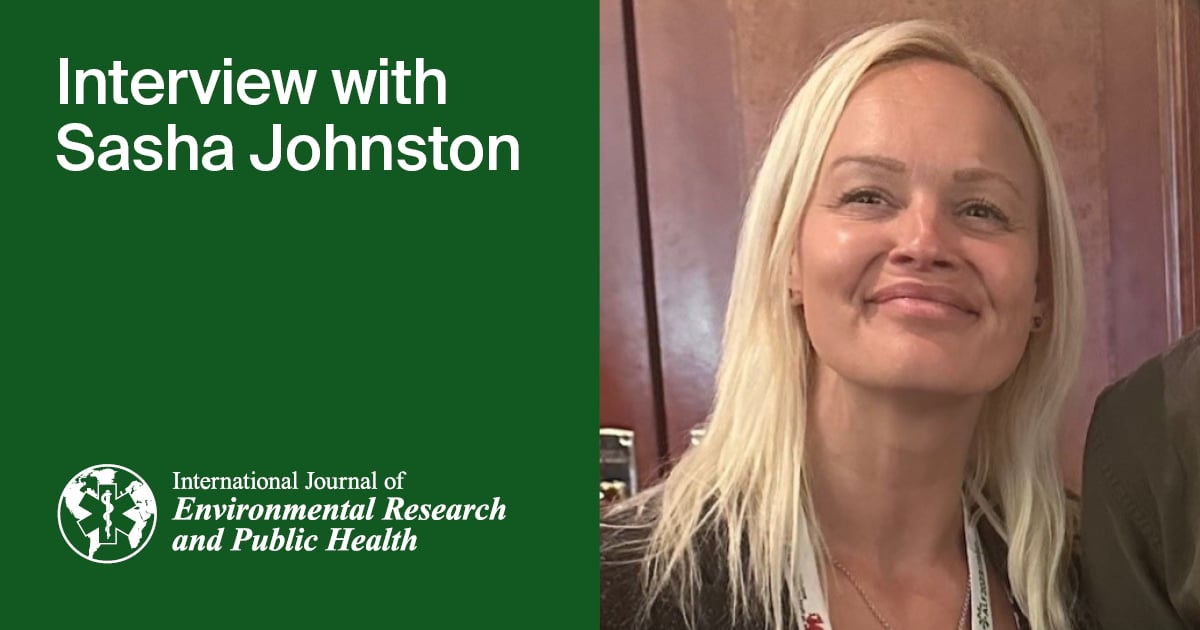
Journal Menu
► ▼ Journal Menu-
- IJERPH Home
- Aims & Scope
- Editorial Board
- Reviewer Board
- Topical Advisory Panel
- Instructions for Authors
- Special Issues
- Topics
- Sections & Collections
- Article Processing Charge
- Indexing & Archiving
- Editor’s Choice Articles
- Most Cited & Viewed
- Journal Statistics
- Journal History
- Journal Awards
- Society Collaborations
- Conferences
- Editorial Office
Journal Browser
► ▼ Journal Browser-
arrow_forward_ios
Forthcoming issue
arrow_forward_ios Current issue - Vol. 22 (2025)
- Vol. 21 (2024)
- Vol. 20 (2023)
- Vol. 19 (2022)
- Vol. 18 (2021)
- Vol. 17 (2020)
- Vol. 16 (2019)
- Vol. 15 (2018)
- Vol. 14 (2017)
- Vol. 13 (2016)
- Vol. 12 (2015)
- Vol. 11 (2014)
- Vol. 10 (2013)
- Vol. 9 (2012)
- Vol. 8 (2011)
- Vol. 7 (2010)
- Vol. 6 (2009)
- Vol. 5 (2008)
- Vol. 4 (2007)
- Vol. 3 (2006)
- Vol. 2 (2005)
- Vol. 1 (2004)
Need Help?
Announcements
23 July 2025
International Journal of Environmental Research and Public Health | An Interview with One of the Authors—Ms. Sasha Johnston

Name: Ms. Sasha Johnston
Affiliations: 1 Department of Experimental Psychology, University of Oxford, Oxford OX1 2JD, UK; 2 South Western Ambulance Service NHS Foundation Trust, Bristol BS16 IDE, UK
“Why Do Emergency Medical Service Employees (Not) Seek Organizational Help for Mental Health Support?: A Systematic Review”
by Sasha Johnston, Polly Waite, Jasmine Laing, Layla Rashid, Abbie Wilkins, Chloe Hooper, Elizabeth Hindhaugh and Jennifer Wild
Int. J. Environ. Res. Public Health 2025, 22(4), 629; https://doi.org/10.3390/ijerph22040629
- Could you briefly introduce yourself and your current research focus?
Thank you. My name is Sasha Johnston, and I am a paramedic by profession, currently working with the South Western Ambulance Service in England. I’m also undertaking a Doctoral Fellowship funded by the National Institute for Health and Care Research at the University of Oxford. My research focuses on employee well-being in emergency services, particularly examining the cultural barriers and facilitators that influence ambulance staff’s access to mental health support services. While support programs are increasingly available, their uptake remains low, despite the high prevalence of mental health challenges in this workforce. My work seeks to understand and improve this situation. - What were the main challenges or breakthroughs in conducting this research?
Conducting research in a live emergency environment is inherently difficult—there are constant 999 calls, staffing shortages, and high-pressure settings. The emergency services field is less mature in terms of research infrastructure compared to hospital or nursing contexts. Yet ambulance services play a critical role in patient outcomes, as about 50% of patients in UK hospital beds arrive via ambulance. This underlines the importance of developing a research base that is rooted in the unique realities of prehospital care, rather than relying solely on hospital-based findings. - What motivates your research in this field?
My motivation is deeply personal. After 17 years of work I loved, I experienced a traumatic incident that shifted my sense of safety. I was fortunate to have access to support services, but many colleagues have not been so lucky—some have died by suicide. Since 2018, we have recorded 55 such cases among ambulance staff in England. My goal is to foster a system where staff feel safe, supported, and empowered to seek help without stigma. Healthy staff deliver better patient care, and that connection drives my work. - How would you describe current trends in your field, and what advice would you give to early-career researchers?
We’re seeing a welcome shift toward integrated, multidisciplinary approaches—combining public health, social science, and frontline experience. There’s also an emphasis on co-production, where employees and stakeholders are involved from the start of the research process. For early-career researchers, I recommend attending conferences, networking, and saying yes to new opportunities. I’ve been lucky to receive NIHR support and work with incredible supervisors. Finding the right people and mentors is crucial, especially in under-researched fields like emergency services. - What was your experience publishing with IJERPH, and why did you choose this journal?
Choosing the right journal was important. IJERPH was a great fit for our systematic review, especially because of its relevance and open access model. The publishing process was smooth—reviewers understood our methodology and provided constructive feedback, particularly around balancing detail with clarity in the manuscript. Communication with the editorial team was excellent, and having this interview opportunity is a wonderful bonus. I’m already working on a follow-up qualitative study and would be happy to submit again to IJERPH or other MDPI journals.



